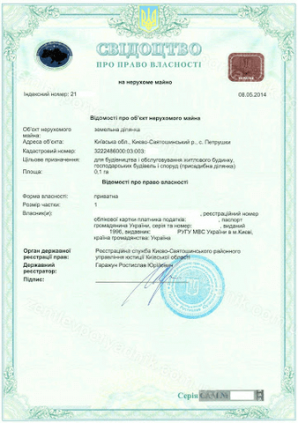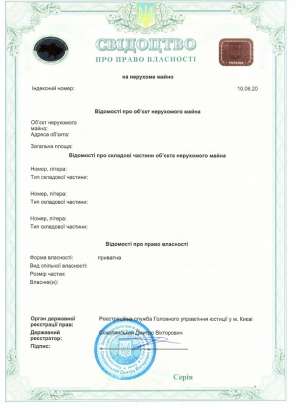Registration of the sale of a share in an apartment: legal aspects
Cost of services:
Reviews of our Clients
... our work on joint projects assured us of your high level of professionalism
Buying real estate doesn't always entail acquiring the entire property. In practice, it's quite common to encounter scenarios involving the sale, purchase, or acquisition of only a portion of the real estate. These situations include inheritance, obtaining a share of property during divorce, and more.
Today, our legal experts will share their knowledge on the process of drafting a partial ownership purchase agreement for an apartment. If you're interested in finding out not just the procedure, but also who can provide you with assistance, feel free to contact our specialists for consultation and support.
If you're planning to acquire a specific share of real estate
Ownership of a share in a property doesn't mean you own a specific part of the real estate. In other words, if someone holds a 50% share in the ownership of a residential house, they are only selling that share, not half of the house itself.
A share is a specific legal concept that defines the extent of ownership in terms of a percentage, without specifying particular physical portions of the property. A co-owner doesn't own a particular portion of the property, like a specific room, but rather a defined portion of the property's ownership rights, which can be managed by the co-owner, including through actions like gifting that share without physically dividing the property.
When you're in the process of formalizing the purchase of a share in an apartment, it's crucial to understand precisely what you'll be acquiring. In practice, private homes are often divided between two co-owners with defined shares, such as 50% each, and with the conditional separation of utility structures. This division may exist in practice, but the specific properties are typically identified in legal documents without detailed descriptions. Consequently, disputes between co-owners can arise fairly frequently in such cases.
It is crucial not only to buy a portion of real estate but also to determine precisely what you have acquired within that specific property.
An apartment, house, land parcel, or any other type of real estate can be owned by individuals under the umbrella of joint ownership.
Joint ownership is established either directly by law or through an agreement and comes into effect when ownership shares are not explicitly defined. A share in joint ownership, without a designated allocation, has limited transferability. Consequently, spouses can only enter into agreements with each other concerning their shares in joint ownership.
Co-owners possess the right to utilize jointly owned real estate only through mutual consent. This implies that they must reach an agreement among themselves regarding the property's use. Nevertheless, each co-owner retains the autonomy to manage their share in joint ownership, while respecting the preemptive rights of other co-owners to acquire that share.
Who has the priority right to purchase a share?
When arranging the sale of a share in an apartment, other co-owners have the first right of refusal. This procedure is well-defined. Essentially, the consent of one of the co-owners to dispose of the jointly owned property is a unilateral transaction. When such a transaction takes place, the intention is expressed (or emanates) from one side.
The seller is obligated to notify the other co-owners in writing about the sale of the share, specifying the price. It's advisable to obtain a statement from the co-owner renouncing their preferential right to purchase the share.
Due to the introduction of a state of emergency, the timelines for refusal or acceptance of an offer to formalize the purchase of a share in an apartment have slightly changed. Previously, it was one month; now, it remains in effect as long as the state of emergency lasts. This has led to a sort of gap that can be exploited for further misuse of the preferential rights of co-owners, where one co-owner delays the process, does not utilize their preferential right, and does not renounce it, thereby preventing another co-owner from disposing of their property.
In cases involving commonly used agreements, such as gifts or exchanges, the preferential right of other co-owners to purchase the share does not apply. If multiple co-owners wish to formalize the sale of a share in the apartment, the seller has the right to choose the buyer.
How to allocate your share of the property: formalizing the sale of a share in an apartment
Joint ownership can be terminated through property division among co-owners or at the request of other co-owners, especially when the share is negligible or due to court-ordered enforcement.
In situations where it's not physically feasible to separate a share from a jointly owned property or when the property is indivisible, a co-owner has the right to receive financial or other material compensation equivalent to the value of their share. Property held in joint ownership can be divided by mutual agreement, as specified in a notarized contract. Following such a division, joint ownership is considered to be terminated.
The following documents shall be submitted to the notary:
- Title deeds.
- A statement confirming the technical feasibility of dividing the real estate object or a statement confirming the technical feasibility of allocating a specific portion from the real estate object.
After the notarization of the contract, the notary will create new technical passports for the newly created units and assign postal addresses to these units. Additionally, the ownership rights will be registered for the new owners.
It's important to note that properties containing unauthorized constructions cannot be divided through this process. Such constructions must first be officially approved and put into operation.
When allocating a share from jointly owned real estate, such as an apartment, the co-owner whose share is being allocated, and the co-owner(s) whose share(s) remain, should receive separate, distinct units. These units must meet certain criteria:
- They must be physically separated from the premises of other co-owners.
- Each unit should have its own independent exit.
- Each unit should be connected to essential utilities such as water supply, sewage, heating, etc., independently.
In essence, each allocated unit should constitute a distinct piece of real estate.
Processing the sale of an apartment: Documents and notarization specifics
A contract that results in the transfer of ownership shares or their division is notarially certified, and the resulting rights are registered in the property registry. During transfers, allocations, or divisions, both the composition of property owners and the property itself can change, but only the shares' proportions change.
An essential aspect of certifying the contract is the procedure to respect the co-owners' preferential right to buy a portion. Failure to adhere to this procedure can lead to a co-owner, feeling their rights have been infringed, taking legal action to assume the buyer's rights and responsibilities.
If the property is jointly owned, it can only be transferred between spouses. In cases where the transfer benefits someone else (including the free transfer of property), it's necessary to specify and allocate the share in kind or establish the terms of property use.
Upon the dissolution of a marriage, the right to jointly owned property acquired during the marriage remains unchanged. Therefore, the disposal of such property can only occur through mutual agreement among co-owners.
If you require assistance with the purchase or sale of a share in an apartment or house, our legal firm can be a dependable partner in this process.
Our experienced lawyers will provide professional support, ensuring full compliance with all legal requirements and regulations. They will also conduct a property audit to mitigate risks.
Contact us today, and we will help you efficiently and promptly complete all necessary documentation while safeguarding your rights and interests.
Our clients







